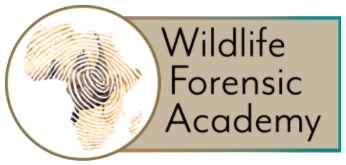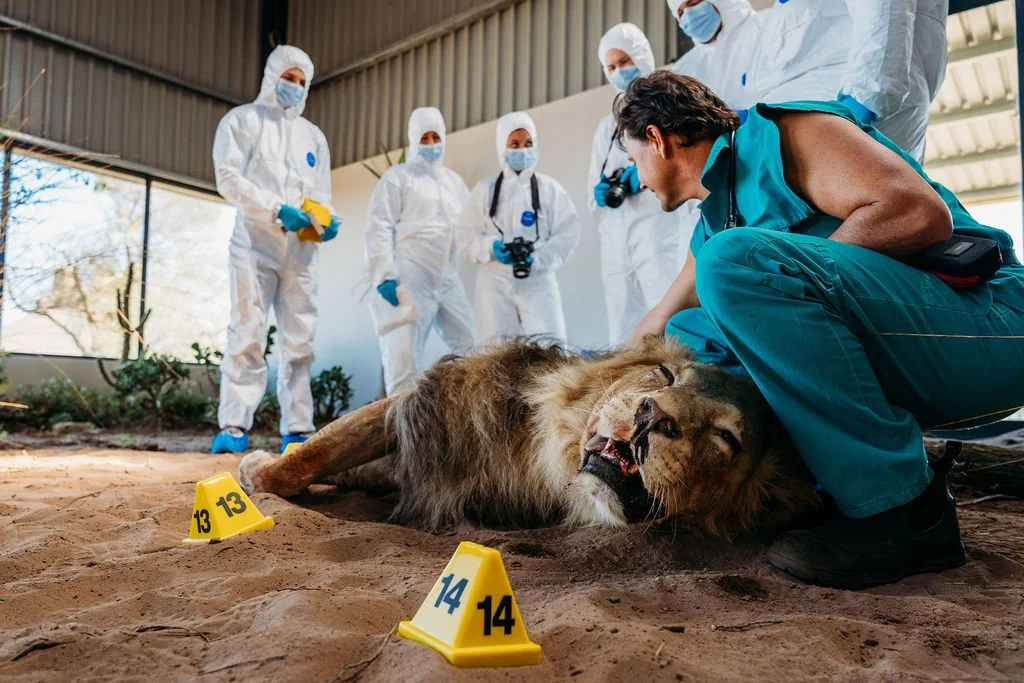4 Weeks Wildlife Forensic Course for Internationals
This training builds on the Wildlife Forensic Academy’s two week training with an additional two weeks of expanded in-depth practical training and lectures in Forensics, Veterinary Science and Ecology. Taking place at the Wildlife Forensic Academy in the Western Cape, as well as at other educational sites in the Eastern Cape, this training provides a truly unique African Wildlife Educational Experience.
Objectives:
In-depth understanding of Wildlife Forensics, Wildlife Crime and illegal wildlife trade;
Gain confidence to conduct a Wildlife Crime Investigation with Forensic Trace Collection, documentation and presentation of evidence in a courtroom;
Unique learning experience in Africa. Witness the diversity of South African wildlife and be exposed to the issues and role-players in this field.
Program:
This training includes the following:
Introduction to Wildlife Crime, Poaching and Illegal Trade;
Preservation of a Crime Scene;
Role of Forensics;
Forensic Traces (Detection and Collection);
Crime Scene Management;
Forensic Photography;
Wildlife Anatomy: Handling and First Aid;
Human-Wildlife Conflict;
Hands-on Experience Laboratory Training:
Human Behaviour at the Crime Scene;
Virtual Reality Training;
Crime Scene Scenario Training;
African Park Management and Conservation;
Courtroom Training;
Injured and Poisoned Animal Management;
Health: Wildlife and Human: Risks and Prevention;
South African Fauna and Flora;
Basic African Ranger Training Exposure;
Practical Conservation Management and Conservation Principles;
Anti-Poaching Activities and Experiences;
Veterinary Role in African conservation;
Species Specific Management;
Re-Introductions and Sustainable Utilization;
Wildlife and ecological monitoring and management
Wildlife Capture and Immobilisation Practicals - if available;
Handling and Containment of Animals/Animal rehabilitation;
Protected Area Systems and Economics;
Socio-Economic Issues to Consider in African Conservation;
Comparing Conservation Models;
Pathology and Stress Related Mortalities;
Excursions:
Game Walks;
Game Drives;
Included Educational Touristic Activities:
San Cultural Experience;
Marine Conservation and Research;
Tour of Cape Point and Table Mountain;
Cape Town Waterfront;
Two Oceans Aquarium Educational Tour;
Seabird and Raptor Rehabilitation Tour;
Cheetah Outreach Educational Tour;
Game Drive;
There will also be a social morning with surfing/sea kayaking/whale watching - weather permitting.
What You Will Learn:
You will be introduced to a wide range of wildlife crime cases and the methods used to investigate them.
You will expand and apply your knowledge of forensic science and investigative techniques to a variety of wildlife crime scenarios, focusing on the challenges and crime types seen in Southern Africa.
You will learn local ecology, history and survival skills in this environment.
You will learn how to behave when encountering a wildlife crime scene, which may include alive and injured animals.
You will learn to correctly identify and document forensic traces and build crime scene documentation that you will present in a moot court room.
You will learn how key principles of forensic science, such as continuity and integrity of evidence, crime scene documentation and evidence recovery and analysis are used in wildlife crime investigations.
You will have practical experience in the preservation, documentation and analysis of wildlife crime scenes using the state-of-the-art crime scene facility at Buffelsfontein Game and Nature Reserve in South Africa.
Mock scenes will provide you with the opportunity to plan and implement crime scene investigations that mimic real-life scenarios.
You will gain knowledge of other disciplines that are important in wildlife crime investigations including forensic veterinary pathology and injured animal management.
You will also participate in a range of educational excursions and activities which will provide you with knowledge of the different landscapes, organizations and initiatives actively working in conservation in South Africa as well as gaining a better understanding of South African culture.
You will learn about how to handle animals and assess injuries. You will learn about the anatomy of animals and how to conduct a post-mortem for a forensic purpose.
You will assist with wildlife veterinary activities, wildlife capture and immobilization practical sessions, the handling and containment of animals as well as basic - SUBJECT TO AVAILABILITY.
information on veterinary pharmacology.
You will learn more about the veterinary role in African conservation as well as pathology and stress related mortalities.
You will get exposure to what the rangers of conservation areas do, weapon handling and on how anti-poaching operations at game reserves work.
Exposure to different landscapes within the rural and urban conservation context in South Africa will assist you to understand conservation principles, different conservation models, protected area systems, socio-economic issues in Africa as well as human-wildlife conflict and the management thereof.
You will gain experience in terrestrial and marine conservation and care of terrestrial and marine animals.
A fieldtrip to the Eastern Cape province of South Africa will assist with your understanding of species-specific management, re-introduction and sustainable utilization.
Activity Structure:
How You Will Learn:
A mix of lectures, demonstrations, flipped classroom and hands-on practical activities will be utilised. In addition, education excursions will be integrated into programme to provide background context to South African wildlife, conservation and culture.
Lectures
Theory, knowledge, understanding
Experimental Learning
Practice, problem solving, application
Educational Excursions
Context, background, culture
Educational Aims:
To introduce and expand knowledge and practical skills in wildlife crime
investigations with particular focus on South African flora and fauna including
current conservation challenges and legislation.
To apply current forensic and policing knowledge and skills to wildlife crime
investigations including the criminal justice chain and recovery, analysis and
interpretation of evidence.
To introduce and expand knowledge on basic wildlife veterinary practices and procedures and to demonstrate how these link to conservation and the management of large conservation areas.
To experience and understand conservation practices and context in rural and urban areas in South Africa as well as the challenges encountered by terrestrial and marine oriented conservation organizations.
Learning Outcomes:
Apply current knowledge of forensic science and investigative techniques to a range of wildlife crimes.
Interpret and demonstrate an understanding of the current legislation conservation challenges, including human-wildlife conflicts and evaluate the impact that these have on the investigation of wildlife crimes.
Demonstrate an understanding of the main theoretical and practical skills of personnel who investigate wildlife crimes.
Demonstrate knowledge in the main procedures used in wildlife crime scenes, documentation and analysis.
Apply practical skills to the investigation and interpretation of evidence from a mock wildlife crime case.
Communicate findings from a wildlife crime investigation.
Contextual knowledge of wildlife crime, illegal wildlife trade, human and wildlife conflict and their associated mitigation measures in the Western Cape, South Africa.
Apply the basic principles of wildlife management and utilization through adaptive conservation management and by assisting with basic veterinary activities.
Demonstrate an understanding of the role of veterinary science in African conservation as well as the challenges encountered.
Interpret conservation and conservation management in different protected areas in South Africa as well as the different roles filled by staff, partners and stakeholders.
Contextual knowledge on human-wildlife conflict and poaching as well as the challenges faced by rangers, ecologists and anti-poaching units.
Apply the basic procedures needed for terrestrial and marine animal reintroduction as well as demonstrating an understanding of re-wilding, speciesspecific management and sustainable utilization.
Apply the basic principles of wildlife management and utilization through adaptive conservation management and by assisting with basic veterinary activities.
Demonstrate an understanding of the role of veterinary science in African conservation as well as the challenges encountered.
Interpret conservation and conservation management in different protected areas in South Africa as well as the different roles filled by staff, partners and stakeholders.
Contextual knowledge on human-wildlife conflict and poaching as well as the challenges faced by rangers, ecologists and anti-poaching units.
Apply the basic procedures needed for terrestrial and marine animal reintroduction as well as demonstrating an understanding of re-wilding, species specific management and sustainable utilization.
Location:
The training will be facilitated on a reserve on the West Coast of South Africa, Cape Town and the Eastern Cape
What’s Included:
Accommodation at Buffelsfontein Nature and Game Reserve;
Catering (Breakfast, Lunch and Dinner);
Transport during the course;
Airport Pick Up and Drop Off;
All park entrance fees and permits.
Not Included:
Alcoholic drinks;
Flights to and from Cape Town
Upcoming Course Dates:
19 May 2024 [FULLY BOOKED]
2 June 2024
16 June 2024 [FULLY BOOKED]
14 July 2024
11 August 2024 [LIMITED AVAILABILITY]
1 September 2024 [LIMITED AVAILABILITY]
2 February 2025
Cost:
€5400








